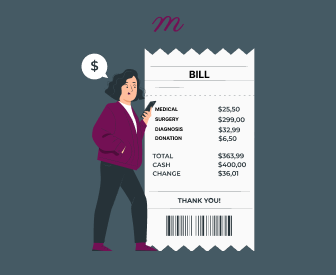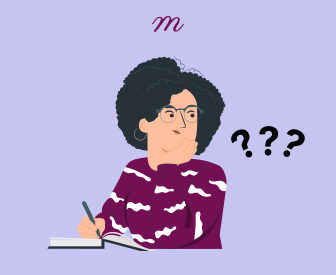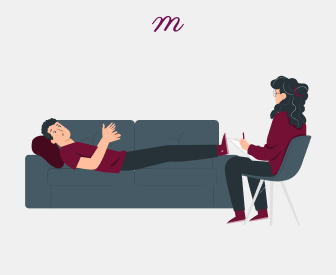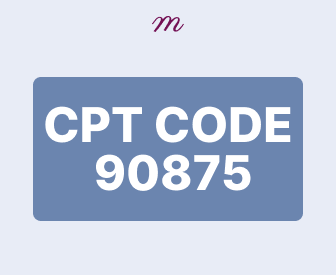Have your progress notes written for you automatically
If you’re a mental health professional, billing can be overwhelming. It’s challenging to know what billing codes you need and when. As a psychotherapist, you must remember many codes to keep on top of getting appropriately reimbursed for your services.
You may ask questions like what codes do I use for what services? When do I use this code vs. another code? What code do I use for intakes vs. what codes do I use for individual, family, group, or couples sessions?
Those are all great questions, and billing codes can be a mystery sometimes. Current Procedural Terminology (CPT) codes are used for many mental health services.
One standard CPT code you may use is the 90791 code. This code is used for biopsychosocial assessments and is billed in the first session. Here’s an overview of when to bill the CPT code 90791 and when you should use it in your practice.
What is the 90791 CPT Code?
The 90791 CPT code is used for intake appointments in psychotherapy. Psychotherapy intakes generally last about an hour but can span multiple sessions. The intake appointment is typically where the clinician reviews policies, discusses informed consent, and discusses therapy risks and benefits with their clients. It is usually billed in your first meeting with a client.
The clinician often works with clients during the intake appointment to set collaborative goals. It should give the clinician an understanding of what the client wants from therapy and what they hope to accomplish in the therapeutic relationship. Intake appointments set the framework for the therapeutic relationship.
Some other names might be assigned to an intake appointment. It may also be referred to as a biopsychosocial assessment or a diagnostic evaluation. Both of these terms are other terms for the first appointment in which you evaluate a client or gather background information from your client.
Some insurance companies and third-party payors such as Medicaid and Medicare might ask that you diagnose in your first session with a client. In that case, you may ask questions about the client’s symptoms, previous mental health diagnoses, substance use history, and any relevant clinical conditions that may impact your client. In fact, many insurance companies require you to provide a diagnosis or provisional diagnosis in the first session.
How long should an intake Appointment be?
Intake appointments vary in length and can depend on the clinician. If you’re using a third-party payor for your services, such as Medicaid, Medicaid states that the 90791 CPT code should be used for at least 16 minutes and no longer than 90 minutes.
Many clinicians average about an hour for a standard intake session. The time you spend in an intake may depend more or less on the client’s or clinician’s needs.
It would be best if you billed the intake for the time when you are in the appointment. To adequately track start and end times, you must pay attention to detail and ensure accuracy in your documentation.
It may be helpful to use an electronic health records system, as many of them track your sessions’ start and end times for you. Others may have a paper notation system where they follow beginning and end times. No matter how you track your sessions, ensure you’re consistent, organized, and billing the correct amount of time.
What happens in an intake appointment?
Intake appointments are billed with a different code than other mental health services because they differ from your typical psychotherapy appointment. As mentioned earlier, the intake is the framework for therapy.
Thorough intake appointments and proper documentation help you develop a solid action plan for your work with the client. You will often formulate treatment plans from the information you gather from your intake appointments that are aligned with the client’s goals and desires for therapy.
You may be performing a mental status exam and assessing or asking about the following in an intake appointment:
- Family history
- Trauma history
- Relationships with others
- Employment/Educational background
- Substance use history
- Previous mental health diagnoses
- Previous hospitalizations
- Medical history as it relates to mental health
- Suicidal or homicidal ideation
- Current stressors
- Past experiences in therapy
- Mental health concerns/symptoms
- Goals for therapy
Intake appointments also offer a space for clients to ask any questions that they may have about the therapeutic process, your policies, billing and payment, scheduling availability, and any other office or practice policies. Your client may ask many questions about your procedures, or they may be comfortable reading through and signing your documents without many questions.
Clinicians must be prepared to address and discuss policies with clients. You may also discuss a plan of action with your clients for how you both can address their goals and reasons for being there.
When and how do you use the CPT Code 90791?
When you bill for the day, if you had an intake appointment, which is often the first session, you will bill 90791 for intake appointments that lasted anywhere from 16-90 minutes. Ensure you’re billing the face-to-face time with the client in session.
It’s essential always to have a method to document the beginning and end of your intake appointments so you can keep track of those for billing purposes. Billing accuracy helps ensure you get appropriately reimbursed and helps have a standardized method for charting your services that other payor sources can easily read.
With 90791, you also want to ensure that you aren’t billing this code if you’re a provider that can provide a medical evaluation concurrently with an intake. 90791 is designated only for intake appointments without a medical evaluation component.
Mental health professionals can also use outside diagnostic information from family members or other individuals close to the client for the intake assessment. The CPT manual discusses gathering history, reviewing the client’s mental status, and making recommendations.
Mental health professionals can do various clinical duties in the first session; it’s always wise to check with your applicable state laws and regulations regarding what can be provided in an intake session.
There are other CPT codes associated with other types of psychotherapy sessions. These are billed differently than the intake appointment. For example, individual psychotherapy appointments are billed with different codes depending on the length of the psychotherapy session.
You may continue to gather background information in a psychotherapy session and perform mental status exams as a psychotherapist in psychotherapy sessions; however, these are not billed the same when they are conducted in individual psychotherapy sessions.
Billing CPT code 90791 is a necessity for most mental health professionals. Using it correctly will help you stay organized and provide a frame of reference for future work with your client or clients.
Why is it essential to get the 90791 code right?
CPT codes were developed to give healthcare professionals a universal language to describe services provided to them. When others look at your progress notes or initial appointment notes, and you’ve billed 90791, many people will know or can quickly determine what service was provided.
Accuracy of mental health documentation is essential as it helps prevent fraud, enables you to get reimbursed appropriately from third-party payors, and helps protect the valuable services you provide. Proper documentation is necessary for most mental health professionals, and when it is done correctly, it can be a weight off your shoulders.
It informs others about the services a client needs and can help protect you if your records are audited. Many clinicians can find mental health documentation challenging or overwhelming, especially if you’re a neurodivergent clinician. Luckily, there are various tools available that can help you get the job done right.
Billing 90791 in a Nutshell
Billing intake appointments doesn’t have to be a headache or a source of stress. While the CPT codes can be confusing for different services, 90791 is pretty straightforward. If you’re completing a biopsychosocial assessment and this is your first session with a client, you will likely bill 90791.
The 90791 code encompasses various activities that a psychotherapist engages in. Most of the time, gathering background information and goal-setting are the critical goals for an intake session. A therapist can recommend where to begin therapeutic work to a client at the end of an intake session. Keeping track of your intake session, taking thorough notes, and asking clarifying questions will be standard through an intake appointment.
If you hope to make documentation and billing less stressful, consider trying what Mentalyc offers. Mentalyc is an AI-generated program that helps you write your progress notes for you. You can even write intakes with Mentalyc, leaving you more time to focus on your clients without trying to capture every little detail.
It’s HIPAA-compliant and allows you to customize your notes and intakes to suit your needs. If you want to try Mentalyc, you can sign up here.
References:
- Dotson P. (2013). CPT® Codes: What Are They, Why Are They Necessary, and How Are They Developed? https://www.ncbi.nlm.nih.gov/pmc/articles/PMC3865623/
- Centers for Medicare & Medicaid Services. (n.d.). Billing and Coding: Psychiatric Diagnostic Evaluation and Psychotherapy Services.










